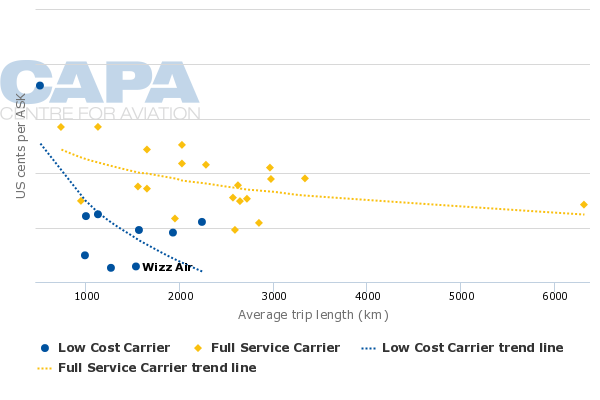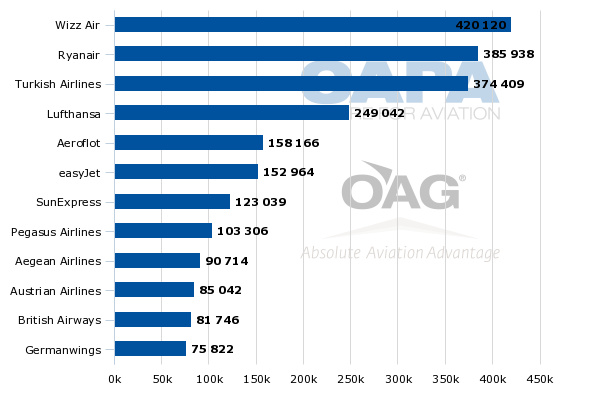INTRODUCTION
The airline industry is one of the fastest-growing sectors in the present business environment or the global market. The present report is in the context of WizzAir, which is a Hungarian low-cost airline headquartered in Budapest. The purpose of this report is to understand various factors, such as external and internal factors, that affect the overall functioning and performance of the airline company. The study will also focus on methods used by WizzAir to develop an effective strategy for gaining competitive advantages in the market. Furthermore, the report will also provide beneficial recommendations to achieve success and sustain itself in a competitive global market.
Need to Consult Directly With Our Experts?
Contact UsBACKGROUND OF WIZZAIR
WizzAir was launched in June 2003 when six individuals with high airline experience and track records joined Jozsef Varadi, who is the chief executive officer of the company. It became a registered airline company, all ready to fly. WizzAit is a low-cost Hungarian airline, which is also known as WizzAir Hungary Ltd. Currently, it offers more than 500 routes from almost 27 bases in various regions, such as Lublin, Poznan, Katowice in Poland, Debrecen and Budapest in Hungary, Varna and Sofia in Bulgaria, etc. The company is a value-oriented airline that focuses on innovation throughout the way of a customer's journey. WizzAir is endlessly looking for potential opportunities to provide low-cost air transport and expand its network of destinations. The company offers flights to a mix of primary, secondary, and regional airports, providing fast and friendly customer service at low cost.
STRATEGIC POSITION OF WIZZAIR
To determine the current strategic position of WizzAir, both the internal and external environment will be analyzed. Competitive advantage has been considered in the business strategies. Several strategies are applied by WizzAir to gain competitive advantages in the market. These strategies are affected by many types of elements in the internal as well as external business environment. Every organization needs to gain competitive advantages, as it helps sustain an impressive position in the market.
Internal Analysis: SWOT
To analyze the internal business environment and factors inside the company, a SWOT analysis can be used. These factors are affecting or influencing overall functioning as well as the performance of WizzAir.
Strengths
- It has a very low unit cost. According to the CAPA CASK database, WizzAir has the second lowest unit cost among all European airlines. Along with Pegasus and Ryanair, WizzAir is categorized as one of the three low-cost airlines in Europe. The main element behind this low level of cost per available seat kilometer is a very effective business model focusing on high labor productivity, secondary airports, and high average aircraft utilization.

- Low fares: Due to the low-cost unit, WizzAir is easily able to offer low-fare air transport to their customers along with maintaining their profitability.
- Leading market share in the chosen market: In the year 2014, WizzAIr was the fifth-largest LCC by passenger numbers and 4th largest by ASKs in Europe. According to OAG statistics for the week of October 2015, the company is the biggest airline regarding seats between Western Europe and Central or Eastern Europe, ahead of Ryanair Airlines.

Weaknesses
- Seasonal earning: WizzAir is highly dependent on the months of summer; the company earns high profits in the summer season as more passengers travel in summer vacations to meet their friends and family.
- WizzAir is operating with lower frequencies as compared to its competitors.
Opportunities
- WizzAir has high opportunities to grow in Central or Eastern Europe; this target market of the company offers potential growth opportunities for many reasons. The first region is that Eastern Europe is less developed as compared to the Western region and hence, its GDP growth rate is high. Secondly, the growth in the economy and transportation links with Western Europe is increasing because of the expansion of the European Union to include various countries in Eastern Europe in recent years.
- Threats
- Ryanair is a great competitor for WizzAir; although the airline is leading by seats overall in the target market, Ryanair often leads in nations where they both operate or compete. Therefore, it is a major threat for WizzAir as competitors can minimize their profit or market share.
- External events: The airline company can be negatively affected by various external activities or events occurring in the environment, such as volcanic ash disruption and earthquakes. These natural and geopolitical events can affect the overall functioning or performance of the airline company.

Stuck with your Assignment?
Hire our PROFESSIONAL ASSIGNMENT WRITERS and Get 100% Original Document on any Topic to Secure A+ Grade
Get Assignment Help
External Analysis of WizzAir
Every organization is also influenced by various elements outside its internal business environment; these elements are known as External factors. The external factors are highly affecting WizzAir's business functions or activities, which can be identified by effective external analysis tools such as Porter's five forces analysis, as mentioned below:
- The threats of new entrants: The companies require a high investment in order to enter the airline industry; WizzAir remarkably brought huge capital while entering into business (Williams et al., 2017). However, the airline industry is a highly profitable sector in the present market; therefore, a high number of new companies are entering the airline industry, which is a great threat to WizzAir. To ensure profitability and sustainability, the company needs to develop effective strategies for gaining competitive advantages in the market.
- Bargaining power of the Buyers: Customers are observed to be the most competitive forces as they have the power to decrease the prices with regards to demanding high quality and more services, Customers also tend to increase market competition. The power of every group of buyers is dependent highly on various characteristics of the market position and situation. Passengers in the business class play a vital role in strategic decisions due to the amount of money they spend; they are potential customers for the airline company, and thus they can highly affect the strategies, functioning, and prices of the company. The buyers are responsible for business success in every sector; customers can switch to various other options in the market or industry.
- Bargaining power of suppliers: Suppliers also play an important role in the overall functioning or performance of an organization. They highly affect the pricing strategy of the company as suppliers influence the cost of production. WizzAir's major suppliers are Airbus and Boing, which provide various resources as well as high-quality aircraft to the company. Therefore, they can highly influence the cost of the company and can affect the profitability of airlines. Various other suppliers in the industry can also affect WizzAir's strategic decisions by changing the price of supplied goods or services. These changes in the resources or supplied goods highly influence the quality of the services, fares, and profit generation of the company. WizzAir needs to consider the types of suppliers it has and try to find effective alternatives for reducing the power of suppliers and their impact on the airline's performance.
- Threat of substitutes: This factor is additionally an important element as it can change the choice of purchasers to switch to another supplier with comparable items and services. Even though air travel is one of the most effective, fast, and modern methods of transportation, individuals can likewise utilize preparation, transport, or auto, keeping in mind the end goal, to achieve the desired goal. The level of this quality is specifically dependent on substantial variables that include cash, time, or individual taste and inclination. A key component is viewed as the exchange taking a toll, as customers can without much of a stretch utilize diverse sorts of transplantation. WizzAir comprehends the need of travelers to have more than one option and is putting forth unique services, for example, leases, auto rentals, and visit bundles, perspectives that bolster its development and notoriety.
- The rivalry between existing contenders: In the airline business, every company utilizes a distinctive strategy with a specific end goal to pick up fame, to fortify the situation in the market, and to build customer loyalty (Belobaba et al, 2015). Other techniques are utilized; value, methodologies, advertising efforts, or including services for customers are the most utilized ones. The carrier industry can end up unstable in the circumstance of activity in a market that has a high number of aircraft. WizzAir chose to forfeit the benefit, keeping in mind the end goal to ceaselessly extend. The business is continually set apart from the container in the middle of players as each carrier tends to pick up pieces of the overall industry from each other. For purchasers, it is anything but difficult to switch contingent upon cost and comfort. For this reason, the level of competition increases consistently.
Recommendations and Conclusions
The above report analyzed that although the airline industry is highly growing and developing in the present market, it has huge competition or rivalry. Many companies are entering the airline industry with new and innovative techniques or strategies but with the help of a low-cost strategy, WizzAir has successfully achieved an impressive position in the European airline industry. The company needs to ensure that it sustains the leading position and profitability in the market; competition is increasing at a huge rate. Therefore, the company needs to develop more effective and beneficial strategies for competing in the market. The most beneficial method to sustain an impressive position in the market is to focus on expanding the market share. The airlines should invest in increasing their market reach or enter into new markets, which can help in gaining more customers, which can lead to increased profitability. Other improvements should be made in the quality of services provided to the customers; high-quality services are very important for obtaining customer satisfaction. To satisfy the changing needs and demands of customers or passengers, WizzAir needs to bring innovative and creative changes in the services offered to them. The company should introduce various new services, such as free luggage carriers, entertainment elements at airports, etc. This will help the airline company to attract more customers and build a strong position in the airline industry. The report identified that the airline company also faces a major threat from the power of suppliers. To deal with this threat or issue, WizzAir needs to ensure that it finds and connects with a wide range of suppliers in the global market for supplying goods or services so that the company can switch suppliers when they increase their costs or prices. The suppliers can greatly influence the cost of production; importing goods from a supplier with low prices can directly reduce the cost of production for the airline company. WizzAir needs to consider all the above factors to sustain its position in the airline industry as well as achieve further growth and development.
REFERENCES
- Belobaba, P., Odoni, A. and Barnhart, C. eds., 2015. The global airline industry. John Wiley & Sons.
- Williams, G., 2017. The airline industry and the impact of deregulation. Routledge.
- Smits, R., 2018. Research on the influence of failure severity on customer satisfaction and loyalty. Does failure type influence the impact on the customer in the airline industry (Master's thesis, Open University of Nederland)?
- Ford, J.B., Paparoidamis, N. and Chumpitaz, R., 2015. Service quality, customer satisfaction, value, and loyalty: An empirical investigation of the airline services industry. In The Sustainable Global Marketplace (pp. 187-187). Springer, Cham.
- Mellat-Parast, M., Golmohammadi, D., McFadden, K.L. and Miller, J.W., 2015. Linking business strategy to service failures and financial performance: Empirical evidence from the US domestic airline industry. Journal of Operations Management, 38, pp. 14-24.


 Company
Company













